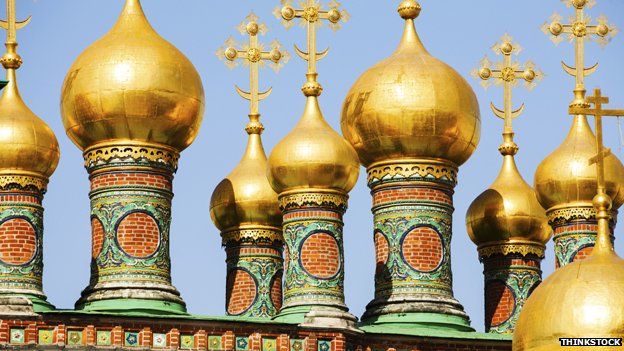The best place for a traveller to fall ill?
- Published

A quarter of a century ago, Kevin Connolly lived in Moscow as the BBC's correspondent. Since then he's reported from across the world, but recently returned to visit his old Russian haunts where, despite huge changes, he found some surprising similarities.
It is a strange feeling to return after a long absence to a city where you once lived. And nowhere is that more true than in Moscow - one of the few places on Earth where the past really is another country.
It feels like working as an archaeologist of your own past, searching for the bones of the old Soviet capital beneath the surface of the modern Russian city.
I ended up retracing my own footsteps a little too faithfully - contracting pneumonia again here as I once did in the period when I lived through five long, dark, Soviet winters many years ago.
Still, even a fleeting glance of this extraordinary place is enough to give you a feeling for what has changed and what has remained the same.
Spring sunshine still comes in sudden bursts with the intensity of a match being struck in a darkened room.
And some old habits die hard. A waiter politely told he'd brought fizzy mineral water instead of flat reacts with intense exasperation - as though he's going to have remove each of the offending bubbles individually with a pair of tweezers.
In another restaurant, a manager helpfully works her way through the enormous menu placing an "X" against the small number of dishes which are actually available, like someone filling in a giant pools coupon.
But there are more positive echoes of the old days too. Pride in the victory of 1945 in what Russians call the Great Patriotic War remains undimmed - the defining achievement of this country's own greatest generation.
The official commemoration may not attract the level of foreign guest for which the Kremlin might originally have hoped. Western governments sense in it an opportunity to express their displeasure at Russia's contemporary manoeuvrings in Ukraine. There will be more ambassadors than presidents or prime ministers on hand to salute Russia's immense contribution to the allied cause.
The private preparations for the big day next month are also well in hand.
A small shop not far from where I'm staying is already offering T-shirts that say simply, "Thank you for our victory granddad." But it's the figure of Josef Stalin rather than granddad who dominates the memorabilia, white of jacket and luxuriant of moustache.
When I lived here 25 years ago, Stalin was almost nowhere to be seen. Soviet cities such as Stalinabad and Stalingrad had been renamed in the early 1960s and little emphasis was placed on his personal role in the victory of 1945.
Now he is back, rehabilitated in the popular imagination, the repression of his time somehow balanced against the scale of that desperate victory.
The favoured image of him has a kind of serene geniality to it, not unlike the one used in old Soviet birthday cards at the height of the cult of personality which read: "Thank you Stalin for my happy childhood."
The shelves of the shop next door to the little souvenir stand show that in other respects things have changed to a startling extent.
Its basic stock-in-trade appears to be the murder weapon, and it offers wide range of replica firearms alongside a choice of knuckledusters, choppers, cutlasses, daggers and bayonets. One of the pistols is rather charmlessly called The Stalker.
It is another rather shocking difference from my own time, when the people of Russia were disenfranchised and disenchanted but were also generally unarmed.
After a prolonged boom based on high oil prices, Russia is now facing a downturn based on low ones deepened by sanctions imposed by the West as a punishment for those actions in Ukraine.
Russian counter-sanctions against European produce are patchy - they don't appear to include French wine or Scotch whisky for example. But the tit for tat deepens a familiar sense of otherness about Russia - the idea that the default setting on its relationship with the West is one of mutual suspicion and hostility.
But the most familiar feeling of all this time around for me was the feeling of contracting pneumonia for the second time in Moscow - surely something of a record for a foreigner.
Much has changed about the medical system since my day, when ambulance crews used to supplement their income by picking up taxi passengers at the roadside when they were on duty.
There are more Western drugs now and a general atmosphere of crisp efficiency in the clinic and doctor's office. But unchanged, below the surface, is that curious Russian ability to conceal immense private kindness behind a rather forbidding public face - the reassuring hand on the shoulder when one grim test result follows another.
With all that has changed - and all that has stayed the same - it was a relief to find that there is still, in that sense at least, no better place for the traveller to fall ill or for the sick man to find himself far from home.
How to listen to From Our Own Correspondent:
BBC Radio 4: Saturdays at 11:30. Listen online or download the podcast.
BBC World Service: At weekends - see World Service programme schedule or listen online.
Subscribe to the BBC News Magazine's email newsletter to get articles sent to your inbox.